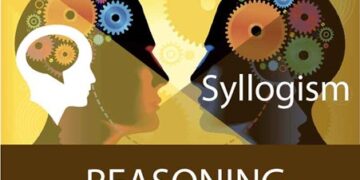
Cognitive reasoning is a 24X7 processing of our mind; we use reasoning to clarify why we took certain decisions, why we said things to someone, why we met someone, why we did not meet someone, why we ate something, why we saw a movie, why we argued with someone. We anticipate others’ reactions and adjust our behaviour according to various social and personal contexts. Reasoning helps us make sense of complex social dynamics, resolve conflicts, and build meaningful relationships based on mutual understanding, respect, and empathy. The entire reasoning is an attempt to figure out something, to settle some inquiry, to solve some problem. Also, some reasoning is based on our assumptions. All reasoning is done from sensible point of view. Much of our reasoning is based on our experience, on data stored in our mind, information, and evidence.
It is essential for making sound judgments and developing effective solutions for complex problems. In essence, reasoning allows us to make sense of the world around us by applying logic and critical thinking to make informed decisions. Reasoning is a vital component of living a happy and fulfilling life. It is a soft skill. Through reasoning we think critically, analyze information, and evaluate arguments, which are all crucial skills in both personal and professional life. Reasoning is a process which goes on constantly at the back of mind.
In today’s fast-paced world, decision making is at the core of every aspect of our lives; whether it’s in our personal relationships, professional careers, or even in our daily routines. The ability to make effective decisions is a skill that can significantly impact our success and well-being. One key ingredient that often goes unnoticed but plays a pivotal role in shaping our decisions is reasoning skills.
Every decision carries some level of risk. Reasoning skills allow us to measure risks more accurately by considering various scenarios and their potential outcomes. This helps us make informed decisions that balance the potential benefits and drawbacks.
Following are different types of reasoning:
Deductive reasoning
Deductive reasoning is a logical approach where you progress from general ideas to specific conclusions. It’s often contrasted with inductive reasoning, where you start with specific observations and form general conclusions. Deductive reasoning is also called deductive logic or top-down reasoning. For example, ethnocentric organizations firms where nationals from a specific parent country dominate the organization at home and abroad. In terms of decision-making, the subsidiaries have very little autonomy. Ethnocentric firms such as Sony, Samsung, Honda believe that Japanese executives are more capable than other national executives. Hence, they appoint their own people at decision-making posts.
Inductive reasoning
Inductive reasoning is a style of drawing conclusions by going from the specific to the general. It’s usually contrasted with deductive reasoning, where you proceed from general information to specific conclusions. Inductive reasoning is also called inductive logic or bottom-up reasoning, which is considering all from bottom to top. McDonald’s as an example of Inductive reasoning. They change their offering to suit the taste of a particular country. In India, where majority people do not eat beef, McDonald’s offers the McAloo Tikki, a vegetable patty with characteristic Indian spices.

Analogical reasoning
It is the ability to recognize and use relational similarity between two situations or events. It is a fundamental aspect of human cognition. It is using a comparison between something new, and something known where we draw conclusions by comparing two things. Reasoning by analogy is a way to help others understand, to convince, and to reason. The founders of Airbnb were inspired by the resemblance of “Bed & Breakfast” model where people share their homes with tourist and friends in which accommodation is provided and breakfast if offered. Bed and breakfast are private family homes. By applying this analogy to the hospitality industry, Airbnb created a new business model in hotel industry. Its primary activities involve facilitating unique stays and experiences for guests, provided by hosts across the world.
Abductive reasoning
Abductive reasoning involves formulating the most probable explanation for a specific set of observations or facts, without necessarily aiming to generate a generalizable theory. It is characterized by its focus on creating a probable premise that best explains the particulars of a situation. In past, people relied on traditional methods to find a partner to get married. In this technology world where almost everything is possible online, people use abductive reasoning that it is easier to find their perfect life partner here on a marriage app. Matrimonial apps have transformed this matchmaking concept into reality. The user-friendly app makes it easy to find a suitable partner in a short time.
Cause-and-effect reasoning
Cause and effect is a system of logical reasoning where evidence and proof are presented to show how an event took place or how something happened. The cause is the reason for the occurrence of an event, while effects include the outcomes of the event that occurred. In this type of logical reasoning, there is a sufficient or necessary condition for any event to occur. The recent 30th July Wayanad landslide incident in Kerala, India is an example of cause-and-effect reasoning. From ecologist Madhav Gadgil to many researchers, who did extensive studies in the wake of the 2018 natural calamities that devastated the state. Despite the back-to-back landslides and warnings by ecologists, the Kerala government went ahead with major infrastructure projects like a twin-tunnel road project in Wayanad, that too at the ecologically sensitive Meppadi region which has been frequently hit by landslides. This landslide is the effect of twin-tunnel road project.
Critical thinking
Critical thinking begins with questioning, analyse, interpret, evaluate and make a judgement about what you read, hear, say, or write. The term critical comes from the Greek word kritikos meaning “able to judge or determine”. Critical thinking is the intellectually disciplined process of actively and skilfully conceptualizing, applying, analysing, synthesizing, and/or evaluating information gathered from, or generated by, observation, experience, reflection, reasoning, or communication, as a guide to belief and action. Google did critical thinking before promotion Sunder Pichai as CEO. Pichai himself is known for his critical thinking ability. At the heart of Google’s success is its culture of innovation, and Sundar Pichai has been instrumental in fostering this environment. Pichai encourages his teams to think outside the box, take risks, and embrace failure as a stepping stone to learning and improvement. One of the key factors that sets Google apart is its persistent focus on the user. Sundar Pichai deeply understands the importance of putting users’ needs first. He encourages his teams to listen to user feedback, anticipate their evolving requirements, and develop products and services that address their pain points effectively.

Decompositional reasoning
Decompositional reasoning is the process of breaking things into essential parts for understanding the function of each factor and how it contributes to the major problem and operation of the item. By analysing each part independently, decompositional reasoning allows an observer to draw powerful conclusions about the whole. For example, before announcing the final diagnosis of patient, the doctor along with member of the clinical team, the laboratory, radiology reports, patient’s family history, patients’ kin everyone has a role to play in ensuring that diagnosis is accurate, timely and communicated to the patient. The Diagnostic Process Map is a complex and collaborative activity that unfolds over time. This is a god example of decompositional reasoning.













































